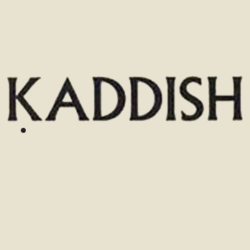The English also suggests why in the midst of saying we cannot praise, celebrate, or sing to God enough to meet the Reality, we also say we cannot CONSOLE (neḥamata) God enough. Why we need to praise God and why we cannot give sufficient praise are clear enough; but why do we need to console God, and why can we not give God consolation enough? We suggest that for the killing of one human, bearing the Image of God, by another –- for this, God is inconsolable.
In this version, changes in the traditional last line of the Hebrew text specifically include not only peace for the people Israel (as in the traditional version) but also for the children of Abraham and Hagar through Ishmael (Arabs and Muslims) and for all the life-forms who dwell upon this planet. The interpretive English addresses the meaning of the Name God is given in most of the Ḳaddish — שְׁמֵהּ רַבָּא “shmeh rabba,” the “Great Name.” It is understood as that Name which includes all the names of all beings in the universe and which is also present within all beings. The Ḳaddish also prays first with concern for the peaceful life of the Jewish “family,” the people Israel, and then in this version expands that concern to include our cousins the children of Abraham through Ishmael and all who dwell upon the earth.
The interpretive English translation below may be appropriate for prayers of mourning and hope in wartime by other spiritual and religious communities.
| Aramaic | Translation (English) |
|---|---|
יִתְגַּדַּל וְיִתְקַדַּשׁ שְׁמֵהּ רַבָּא (קהל: אָמֵן) |
Yitgadal V’yit’ḳadash Shmeih Rabba — May the Great Name, May all the Names of all the beings in the universe, May the names of all who have died in violence and war May the Great Name, |
בְּעָלְמָא דִּי בְרָא כִרְעוּתֵהּ וְיַמְלִיךְ מַלְכוּתֵהּ בְּחַיֵּיכוֹן וּבְיוֹמֵיכוֹן וּבְחַיֵּי דְכָל בֵּית יִשְׂרָאֵל בַּעֲגָלָא וּבִזְמַן קָרִיב וְאִמְרוּ אָמֵן. (קהל: אָמֵן) |
B’alma di vra khi’rooteh v’yamlikh malkhuteh b’ḥayeikhon, u’v’yomeikhon, u’v’ḥayei d’khol beit Yisrael, b’agala u’vizman ḳariv, v’imru Amen: — May Your Great Name lift Itself |
יְהֵא שְׁמֵהּ רַבָּא מְבָרַךְ לְעָלַם וּלְעָלְמֵי עָלְמַיָּא |
Y’hei sh’meih rabba me’vorakh l’olam ul’almei almaya. So therefore may the Great Name be blessed, |
ִיִתְבָּרַךְ וְיִשְׁתַּבַּח וְיִתְפָּאַר וְיִתְרוֹמַם וְיִתְנַשֵּׂא וְיִתְהַדַּר וְיִתְעַלֶּה וְיִתְהַלַּל שְׁמֵהּ דְּקֻדְשָׁא (קהל: בְּרִיךְ הוּא) |
Yitbarakh, v’yishtabaḥ, v’yitpa’ar, v’yitromam, v’yitnasei, v’yithadar, v’yit’aleh, v’yithalal — Shmeih di’ḳudshah, — Brikh hu, (Cong: Brikh Hu) May the Great Name be blessed and celebrated, |
לְעֵלָּא מִן כָּל־בִּרְכָתָא וְשִׁירָתָא תֻּשְׁבְּחָתָא וְנֶחְמָתָא דַּאֲמִירָן בְּעָלְמָא וְאִמְרוּ אָמֵן. (קהל: אָמֵן) |
L’eylah min kol bir’khata v’shir’ata tush’be’ḥata v’neḥemata, de’amiran be’alma, v’imru: Amen (Cong: Amen) Even though we cannot give You enough blessing, And though we know that today there is |
יְהֵא שְׁלָמָא רַבָּא מִן שְׁמַיָּא וְחַיִּים עָלֵינוּ וְעַל כָּל יִשְׂרָאֵל. וְאִמְרוּ אָמֵן. (קהל: אָמֵן) |
Yehei Shlama Rabba min Shemaya v’ḥayyim aleinu v’al kol Yisrael, v’imru Amen. Still we beseech that from the unity of Your Great Name |
עוֹשֶׂה שָׁלוֹם בִּמְרוֹמָיו הוּא יַעֲשֶׂה שָׁלוֹם עָלֵינוּ וְעַל כָּל יִשְׂרָאֵל וְעַל כָּל יִשְׁמָאֵל וְעַל כָּל יוֺשְׁבֵי תֵבֶל וְאִמְרוּ אָמֵן. (קהל: אָמֵן) |
Oseh Shalom bi’m’romav, hu ya’aseh shalom aleinu v’al kol Yisrael v’al kol Yishmael v’al kol yoshvei tevel — v’imru: Amen. You who make harmony |
“Mourners Kaddish in Time of War and Violence” by Rabbi Waskow was first written in 2006 and posted at The Shalom Center, here. For many additional explorations by Rabbi Waskow into prayer, Jewish and beyond, find http://www.theshalomcenter.org/treasury/8. The liturgical Hebrew of the Kaddish to accompany Rabbi Waskow’s transliterations and interpretive translation was added by Aharon Varady for the Open Siddur Project. All errors are his own. Shgiyot mi yavin, Ministarot Nakeni שְׁגִיאוֹת מִי־יָבִין; מִנִּסְתָּרוֹת נַקֵּנִי “Who can know all one’s flaws? From hidden errors, correct me” (Psalm 19: 13).

“קדיש יתום בזמן מלחמה | Mourner’s Ḳaddish in Times of War and Violence, by Arthur Waskow” is shared through the Open Siddur Project with a Creative Commons Attribution-ShareAlike 4.0 International copyleft license.





Leave a Reply